 |
| Scan courtesy El Enmascarado |
Released in May 1947 with “Don’t Move A Vip Till I Say Vop” on the B-side.
Listen to “Sing Re-Bop” on streamed audio here:
Ripped by El Enmascarado from the original 78 rpm disc.
This jive novelty was reviewed in the May 10th 1947 issue of Billboard Magazine along with another platter by the group – “I Cried For You” / “Half Time Boogie” on Super Disc.
The Billboard review of “Sing Re-Bop”:
“For their efforts on this label, the Dole (sic) Dickens Quartet make it a swing thingy for both of these Harlemese jive ditties of their own origination. It’s the re-bop phrasings for the solo voice for “Sing Re-Bop” with the piano, trumpet and guitar also phrasing it that way. And for the mated “Vip” side, it’s the same vocal re-bop style, with all the boys joining in on the song. Harlem jump locations will lay in coins for this cutting.”
 |
| Scan courtesy El Enmascarado |
 |
| Eddie South - "The Dark Angel Of The Violin" |
 |
| The 5 Red Caps in 1944 - Doles Dickens on double bass |
 |
| Red Caps publicity shot clumsily doctored after departure of Doles |
In 1946 Doles formed the Doles Dickens Quartet with the line up as listed at the top of this post. Their first recording session was for Continental sometime in 1946. The four sides recorded were released on two singles – “Hey Honey” / “Holiday For Slang” (Continental 6046) and “Sing Re-Bop” / “Don’t Move A Vip Till I Say Vop” (Continental 6047). The next recording session for the quartet was for Super Disc, probably in early 1947, which resulted in one single, “I Cried For You” / “Half Time Boogie.”
In January 1949 the Doles Dickens Quintet made its recording debut for Gotham, recording four sides released on two singles – “Cabaret” / “Sam’s Boogie” (Gotham 176) and “You’re The One” / “Arnold Fine” (Gotham 185). The latter disc was reviewed in Billboard on July 9th, 1949. “You’re The One” was categorized as “an easy little ballad tune” while “Arnold Fine” intriguingly received a rather barbed review: “from the import of the lyric, Mr Fine is a journalist for whom the Doles Dickens Quintet have the highest regard. This nice thought is framed in a jump boogie arrangement with a touch of bop. With a different lyric, or none, it would have been a pretty piece.”
The Doles Dickens Quintet which signed up with Decca was a completely different group from the Quartet which had recorded for Continental and Super Disc back in 1946 / 1947. The group’s first Decca session was on June 23rd, 1949, and the line up was: Louis Judge (tenor sax); Clarence Harmon (piano); Sam Hendricks (guitar); Doles Dickens (bass); Jimmy Crawford (drums); Joe Gregory (vocals).
 |
| Doles Dickens Quintet |
The Doles Dickens version is a slightly speeded up, slightly smoothed out adaptation of Wild Bill’s rough house waxing. Otherwise it sticks pretty closely to the arrangement of the original. It’s a damned fine dance record as you can see on this YouTube video.
From that first session for Decca in June 1949, two singles were released – “Hold Me Baby” / “Rock and Roll” (Decca 48110) and “Find ‘Em, Fool ‘Em And Forget ‘Em” / “Choo Choo Hop” (Decca 48115). Billboard’s comment on “Find ‘Em …” was “Thumping shuffle rhythm sets the pace for a rousing performance of an amusing novelty.” The reverse side of the platter was also praised as a sequel to Louis Jordan’s hit “Choo Choo Ch’boogie.”
The Quintet’s next Decca session wasn’t until January 1951. Meanwhile on July 8th, 1950, Billboard noted that “Doles Dickens and His Whispers” were about to take up a residency at the Ceders Inn, a new roadhouse near Atlantic City. A group called The Whispers had a record out on Apollo (1156) in March 1950 – “Your Ever Lovin’ Slick” / “Got No Time.” Was it the Doles Dickens band? We hope not, for according to Billboard, the A-Side featured “mediocre warbling, unexciting tenor and rhythm,” while the reverse side was dismissed as a “dull ballad opus.”
Another two Decca singles were cut from the January 1951 session: “All Alone” / “Blues In The Back Room” (Decca 48199), released in March, 1951, and “Blues In The Evening” / “I Only Have Eyes For You” (Decca 48242), released at the end of September, 1951. The latter disc, which was the Quintet’s final release on Decca, received a less than enthusiastic review in Billboard on October 6th, 1951, with the A side being summed up as a “slow blues … effect is on the cold side,” while “I Only Have Eyes …” was dismissed as a “routine entry.” The same edition of Billboard was rather more enthusiastic about “Because Of You” by Tab Smith (“stacks up as a money making proposition”) and “Riding In The Moonlight” by Howling Wolf (“ok for rural market”).
The Doles Dickens Quintet’s final session for Decca was held in New York on April 25th, 1951. The two resulting singles were: “Woogie” / “Can’t Let Your Lovin’ Go” (Decca 48124), released in June 1951, and “Gonna Rock This Morning” / “Won’tcha Tell Me Where She Went” (Decca 48229) which was released in August 1951.
“Gonna Rock This Morning” turned up many years later on the 1984 Ace LP “Jumpin’ The Blues Vol. 1” (CH94) which was where I first encountered Doles Dickens. Back in September 1951, Billboard summed up “Gonna Rock This Morning” as “… a standard rocking blues. It’s good but nothing special.” In this case the Billboard reviewer was probably erring on the side of kindness. The other side of the disc was summed up as “routine blues.”
“Woogie” also turned up on the Ace “Jumpin’ The Blues” three volume set of LPs of Decca and Coral sides. It featured on Volume 2 (CH135) along with such notable efforts as “Take Out Your False Teeth Daddy” by Margie Day, “Sit Back Down” by Little Esther and “Block Buster Boogie” by baritone sax man Cecil Payne. “Woogie is a nice little shuffler as you can hear on streamed audio below:
With the Decca contract not being renewed, this was the end of the Doles Dickens Quintet as a recording act. In July 1952 Doles signed a contract with deejay Ray Hudson to record six sides for his Lion label, but no recordings ever surfaced. The last session featuring Doles as the named artist appears to have been for Dot in 1958. In September of that year “Pia-Kuka-Ung-Cung” / “Our Melody” (Dot 15745) by “Doles Dickens and the De Costa Choir” was released.
The A side (I’m not gonna type it again) must have been something else according to Billboard – “This has the sound of hysteria with guitars, piano and soprano sax and big choral sounds contribute to the wild effects. Has the quality of a jungle war dance.” What about the other side? “A bit of offbeat cacophony that builds and builds.” Sounds like the kind of thing that would turn up on “Jungle Exotica” or “Las Vegas Grind.” It did have a UK release on the London label. I wonder if anyone actually bought the darned thing.
However, this was not the end of Doles Dickens’ recording career. Throughout the 1950s he was an in-demand session man on the New York R&B scene. In November 1952 and March 1953 he was on sessions by Piano Red for RCA. In 1954 he worked for Savoy on sessions for Doc Jones and Wilbert Harrison and the Roamers. In early 1955 he was on a Varetta Dillard session for Savoy. In August 1957 he was on another Piano Red session for RCA and in October of that year he was in the studio with Jimmy Witherspoon, again for RCA. In 1958 he was on a Mahalia Jackson session for Columbia. He popped into Atlantic for a Lavern Baker session in 1959, and in early 1962 along with Charlie Singleton, Buddy Lucas and Sam “The Man” Taylor he cut a series of Twist tracks for Camden. As the 1960s wore on Doles moved into music production and direction. Doles Dickens died in New Jersey on May 2nd, 1972.
And now it’s over to El Enmascarado’s record room to see that original Doles Dickens 78 rpm disc a-spinning on the vintage turntable. But hold! What do we have here? The record room is now doubling as a video editing suite and there are images culled from old films to accompany the crackly sounds. Be Bop Winos will recognize the source of the suitably hep re-bopper visuals on display here. It’s the famous nightclub sequence from the classic film noir D.O.A. Edmund O’Brien is confronted by the latest musical craze in a club called “The Fisherman.” I’m there – I’m the cat in the beret and goatee. Far out!
In his book “Nervous Man Nervous: Big Jay McNeely and the Rise of the Honking Tenor Sax!” Jim Dawson reveals just what is going on musically in the original sequence in D.O.A. On screen the showboating tenor sax man is James Von Streeter and the other musicians are Teddy Buckner (trumpet), Ray LaRue (piano), Shifty Henry (bass) and Al “Cake” Wichard (drums). However the soundtrack features a different set of musicians led by tenor sax man Maxwell Davis. Confusing? Yep.
Sources:
Billboard Magazine, available free to read on Google Books.
Marv Goldberg’s online article on The 5 Red Caps
Albert McCarthy – Big Band Jazz
Bruyninckx Discography
Bruce Bastin – sleevenotes to Krazy Kat LP KK779 “The Red Caps – Lenox Avenue Jump.”
Ray Topping – sleevenotes to Ace LP CH94 “Jumpin’ The Blues Vol.1”
Galen Gart – First Pressings – The History of Rhythm & Blues Volume 2:1952
Jim Dawson – Nervous Man Nervous: Big Jay McNeely and the Rise of the Honking Tenor Sax!
And most of all - thanks to El Enmascarado for "Sing Re-Bop" and its accompanying video.








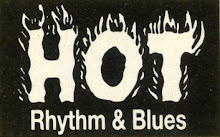
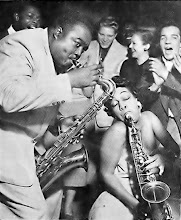





%2045%20-%20502B.png)
.jpg)

















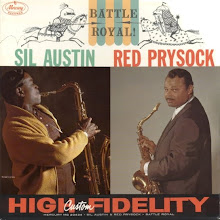
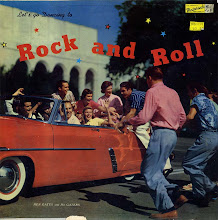
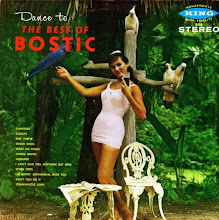
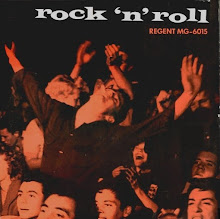
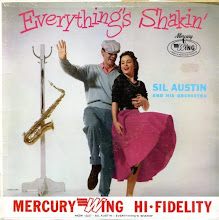






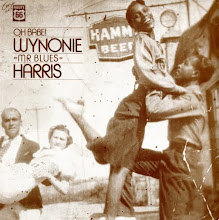

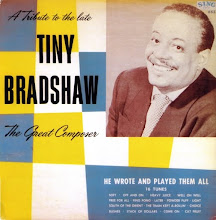





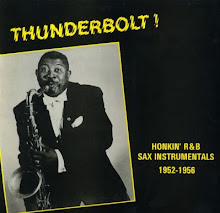

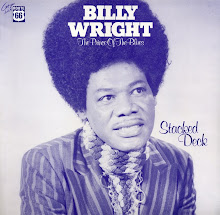






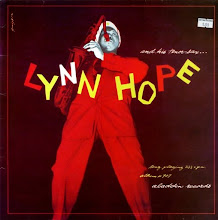



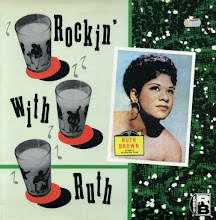


3 comments:
This is about as cool and deep as can be...just what I look for, info wise. Fills in Deep holes in my noggin...all I need is a Dl to hear, but I'll keep lookin'. Thanks, BBW.
Great post. The information deepens my appreciation of the music, and the links are very helpful. Be-Bop Wino is the best-curated site on the 'net for this music. Thank you!
Sam
Thank you for the nice comment.
BW
Post a Comment